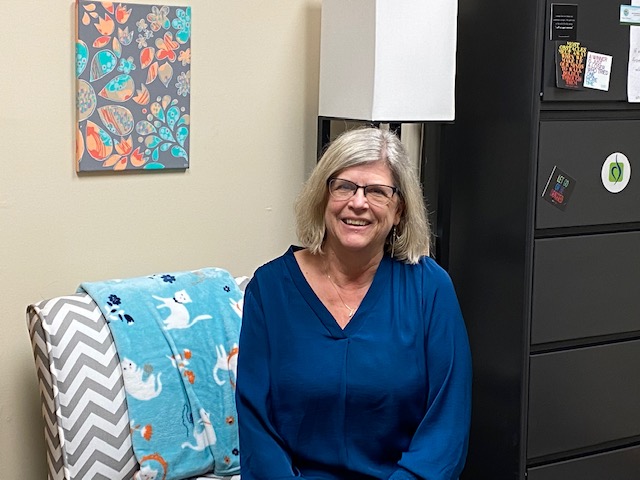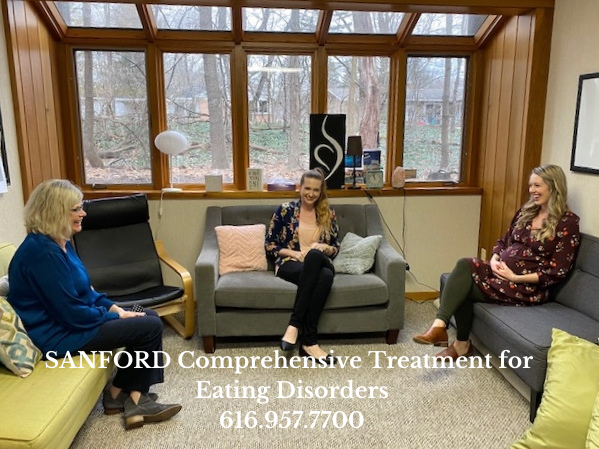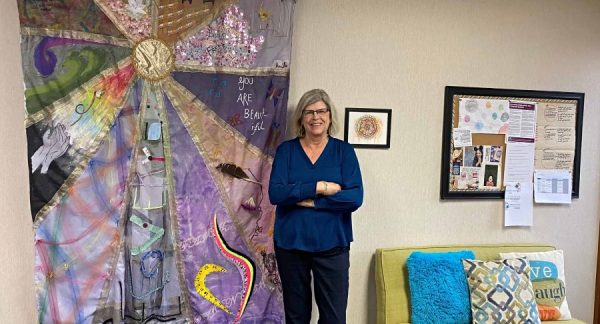Team Approach to Eating Disorders – Limelight Interview

Catch it, challenge it, change it!
Only two weeks ago, we announced Sanford Comprehensive Treatment for Eating Disorders and our partnership with Gail Hall, LMSW, DCSW, CEDS-S and her talented team at CTED. In that time, we have joined forces, and given the high incidence of eating disorders co-occurring with substance use disorders, it was a natural pairing.
Providing a Continuum of Care for Eating Disorders
Joining Sanford and CTED is the next step in expanding mental health treatment in West Michigan and beyond. Both organizations have had a years-long informal partnership. This included consulting, exchanging ideas for programming, and even “swapping” staff for group work with clients. The formal partnership and sharing of resources are a boon to all involved.
We sat down with Gail Hall, Sanford Executive Director, Eating Disorder Services, to talk about her team approach. We also talked about the future of eating disorder treatment and her career “dream come true”.
Eating behaviors are symptomatic. We need to unlock the mystery and determine what the non-verbal message is saying…
Gail Hall, LMSW, DCSW, CEDS-S
The Team Approach, Limelight Interview Gail Hall

Bright colors and aphorisms – Gail Hall in her office.
S – What is your primary focus? How do you personalize your work?
Gail – We provide personalized therapy for eating disorders (ED). We are small enough to be able to understand the specialness of each individual we treat. It’s interesting; unless you need us, you don’t know we are here. But once you have a need, you will find a unique team of therapists and dieticians working together with decades of specialized experience.
S – How are you unique? And why is the team approach beneficial?
Gail – We all work together; our dieticians are in the same building so we can readily exchange information. In fact, a therapist and a dietician may get different information from the same client on the same day. A client may tell the therapist it’s been a great week, but when the dietician asks specific questions about eating behaviors, information that could have been missed will come out. We look forward to incorporating onsite medical staff into the team. And of course, the expertise of Sanford with co-occurring substance use disorders.
S – Does the medical staff need to be trained in eating disorders?
Gail – It is ideal if the psychiatrist and the medical staff are trained to understand eating disorders. Most of our clients have anxiety when it comes to doctors and doctor’s offices: the scale, the casual reference to weight gain or loss.
S – What is your treatment philosophy?
Gail – That eating disorders are symptomatic of something else. Our goal is to unlock the mystery and determine what the non-verbal message is trying to say. At the same time, the symptoms must be addressed directly.
S – Why did you become a therapist?
Gail – (Laughs) because I didn’t want to be a teacher! I was a music major; I play the piano, euphonium, and sing. As a college student I saw a therapist myself and, as corny as it may seem, I decided I wanted to help people. I have always been interested in family and child welfare and empowering young women. Early in my career I was paired with a psychiatrist who had an eating disorder specialty (ED treatment was new in the 80s). After five years, I was hooked. Now, eating disorders are not just the purview of women. Men and transgender individuals are coming forward more readily.
S – Why the increase in men and transgender individuals?
Gail – Because eating disorders are talked about more publicly now. And men are beginning to understand that, for example, binge eating is an ED. And eating disorders are basically a conflict with the body, so it is not surprising that transgender individuals will struggle with eating disorders at high rates.
Eating disorders thrive in secrecy. Our clients often have pre-existing anxiety, so the isolation, political turmoil and uncertainty during the pandemic has amped up eating disorders in the past year.
Gail Hall, LMSW, DCSW, CEDS-S
S- What are the keys to successful outcomes in ED treatment?
Gail – Confront denial. Be firm but warm. Search for ways to make our clients see the danger and risk. And increase the intrinsic motivation – give hope. I think the stigma for eating disorders is even greater than that for substance use disorders, although it has shifted a bit in the last 15 years. But because of denial and stigma, involvement of family members and friends in order to get an individual into treatment is essential. And recovery is not as clear cut as other disorders – there is a gradual return to normalcy.
S – What are the pitfalls?
Gail – Stressful life changes – like a pandemic. And eating disorders peak at key transition times: high school to college, college to career, marriage, having a child.
S- What is the fun part of your job?
Gail – It’s rewarding to see people get to complete recovery. Occasionally I will speak to a previous client and it is so inspiring to hear what they have gone on to do and be!
S – What about the challenges?
Gail – The day to day struggle we might have with a client. A lot of times its one step forward, and one step back. And you have to keep up your spirits and transmit hope. Which is why it is so nice to be part of a team. We kick around ideas and build each other up.
S – Do you read for pleasure or just read scholarly texts?
Gail – I wondered if you were going to ask that. (Whispers) I try to read as little scholarly stuff as possible. (Laughs) I am currently hooked on the Outlander Series. It is a back-in-time story and also a bit steamy.
S – What is your favorite journey?
Gail – Personally, my husband and I love going to Mackinaw Island. We try to make the trip every year. Career wise, the journey I am on now. It is a dream come true after many years of hoping to provide a full continuum of care for eating disorder treatment in Michigan!
S – Any words or phrases you use with your clients?
Gail – Yes. Lot of those – fake it till you make it. And for intrusive thoughts – catch it, challenge it, change it.
S – Last but not least, what makes Sanford unique?
Gail – What has moved me from the very first time I encountered Sanford is the way they have created a warm, homelike environment in which to heal. We have similar missions and values about treatment – making sure our clients get everything they need to recover.
Thanks Gail! S



